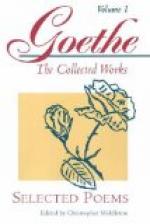She doth a flask of balsam-fire possess,
Sweeter than honey bees can make,
One drop of which she’ll on her finger take,
When soften’d by his love and faithfulness,
Wherewith her monster’s raging thirst to slake;
Then leaves me to myself, and flies at last,
And I, unbound, yet prison’d fast
By magic, follow in her train,
Seek for her, tremble, fly again.
The hapless creature thus tormenteth she,
Regardless of his pleasure or his woe;
Ha! oft half-open’d does she leave the door
for me,
And sideways looks to learn if I will fly or no.
And I—Oh gods! your hands alone
Can end the spell that’s o’er me thrown;
Free me, and gratitude my heart will fill;
And yet from heaven ye send me down no aid—
Not quite in vain doth life my limbs pervade:
I feel it! Strength is left me still.
1775. ----- To Charlotte.
’Midst the noise of merriment and glee,
’Midst full many a sorrow, many a care, Charlotte, I remember, we remember thee,
How, at evening’s hour so fair,
Thou a kindly hand didst reach us,
When thou, in some happy place
Where more fair is Nature s face,
Many a lightly-hidden trace
Of a spirit loved didst teach us.
Well ’tis that thy worth I rightly knew,—
That I, in the hour when first we met,
While the first impression fill’d me yet,
Call’d thee then a girl both good and true.
Rear’d in silence, calmly, knowing nought,
On the world we suddenly are thrown;
Hundred thousand billows round us sport;
All things charm us—many please alone,
Many grieve us, and as hour on hour is stealing,
To and fro our restless natures sway;
First we feel, and then we find each feeling
By the changeful world-stream borne away.
Well I know, we oft within us find
Many a hope and many a smart.
Charlotte, who can know our mind?
Charlotte, who can know our heart?
Ah! ’twould fain be understood, ’twould
fain o’erflow
In some creature’s fellow-feelings blest,
And, with trust, in twofold measure know
All the grief and joy in Nature’s breast.
Then thine eye is oft around thee cast,
But in vain, for all seems closed for ever.
Thus the fairest part of life is madly pass’d
Free from storm, but resting never:
To thy sorrow thou’rt to-day repell’d
By what yesterday obey’d thee.
Can that world by thee be worthy held
Which so oft betray’d thee?
Which, ’mid all thy pleasures and thy pains,
Lived in selfish, unconcern’d repose?
See, the soul its secret cells regains,
And the heart—makes haste to close.
Thus found I thee, and gladly went to meet thee;




